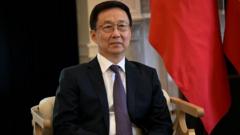Vice-President Han Zheng will represent China at the inauguration, marking a significant moment in US-China relations.
**China's Vice-President Han Zheng to Attend Trump's Inauguration, Signaling New Diplomatic Era**

**China's Vice-President Han Zheng to Attend Trump's Inauguration, Signaling New Diplomatic Era**
China aims to establish positive relations with the United States ahead of Trump's inauguration.
In an unprecedented move, China is sending Vice-President Han Zheng to the inauguration of President-elect Donald Trump, breaking traditional protocol that typically sees foreign leaders abstain from such ceremonial events. This marks the first occasion that a senior Chinese official will be present for a U.S. presidential swearing-in and is seen as a bid to foster a cooperative atmosphere between the two nations.
Chinese President Xi Jinping, recognizing the significance of the occasion, extended Trump an invitation—shifting away from the norm where foreign leaders usually refrain from attending U.S. inaugurations. With ongoing concerns about Trump’s anticipated policies, including the potential implementation of tariffs on Chinese goods, Beijing is keen to approach the new U.S. administration with a strategy aimed at positive engagement.
Analysts suggest that sending Han, a figure known for his political astuteness but not seen as Xi’s closest ally, reflects a desire to establish a level of diplomacy while maintaining some distance. Following his appointment as vice-president in March 2023, Han has focused heavily on foreign relations, notably promoting China's Belt and Road Initiative and participating in international events like the 2022 Winter Olympics.
While Trump has welcomed foreign dignitaries, including leaders from Argentina and Italy, Xi's choice of Han indicates an openness to dialogue without overcommitting China's highest leadership. Observers believe this gesture could lead to constructive discussions, particularly given Trump's proclaimed interest in building relationships with not only allies but also possible adversaries.
Experts underline that should U.S.-China relations take a downturn, Xi's decision to send Han allows Beijing to distance itself from Trump while still maintaining a diplomatic presence. With Han’s attendance, observers anticipate that his dual role as a senior official and a somewhat peripheral player in Xi's inner circle allows China to navigate this complex meeting with a calculated approach.
Amid the backdrop of trade tensions and geopolitical rivalry, the anticipation surrounding Trump's inauguration has already sparked discussions about the future of U.S.-China relations. As both sides prepare for a new leadership phase, this inaugural event may set the tone for future interactions and negotiations between these two world powers.






















